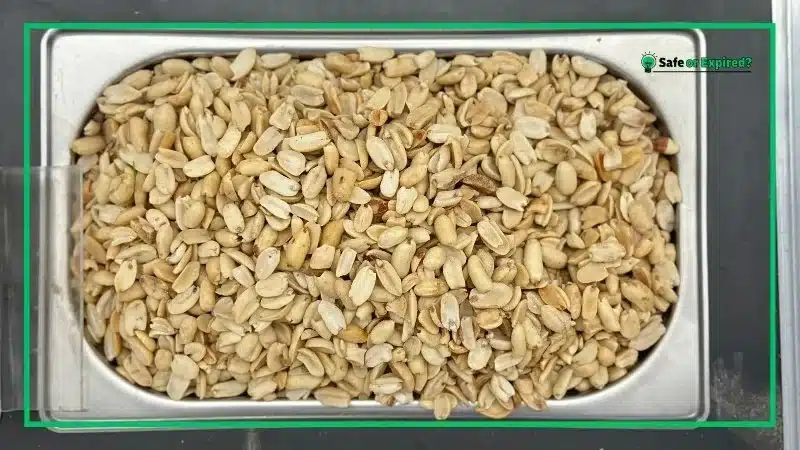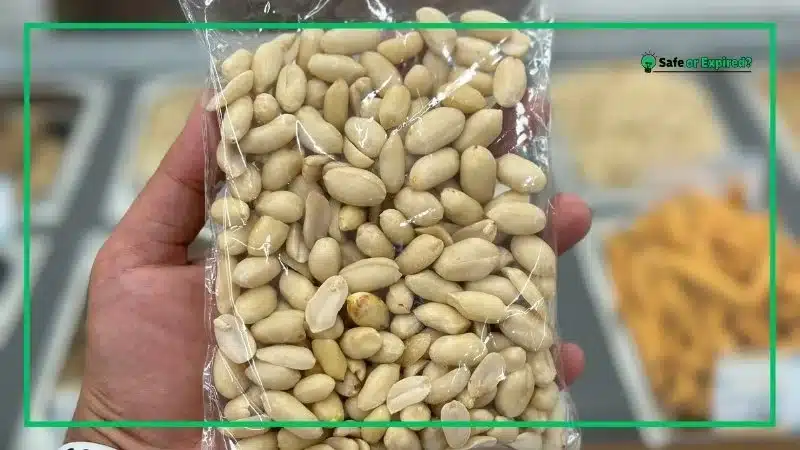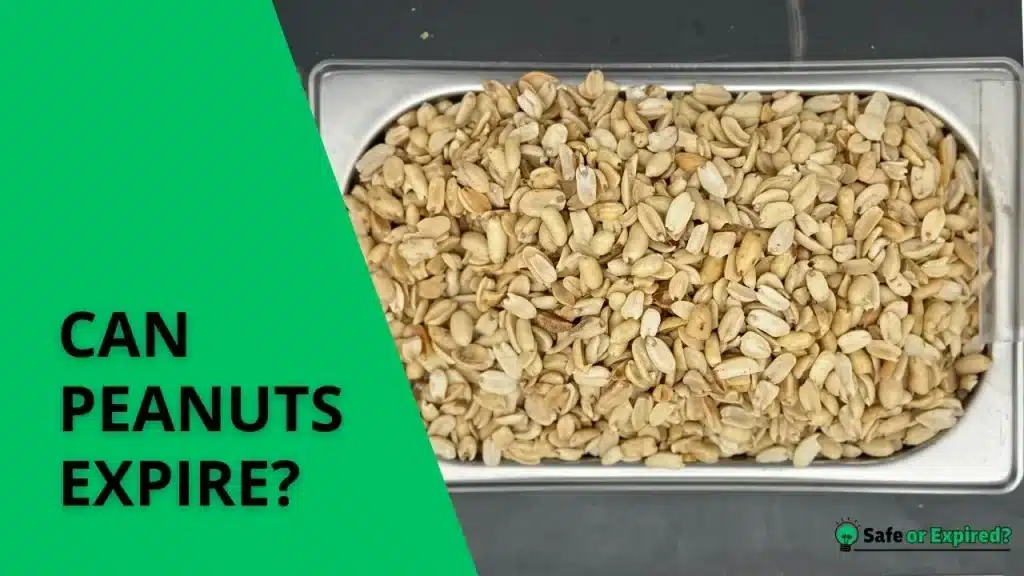“Can peanuts expire?” is often the first step in learning how to safely eat them. They can go bad, but don’t worry—it’s easy to spot the signs. Keep reading to find out more about storing peanuts and preventing them from expiring.
Can Peanuts Expire or do they stay good forever?
Yes, peanuts can expire. While they don’t have a strict expiration date, they can go rancid or spoil over time due to oxidation or moisture. Expired peanuts may develop a stale or off flavor, an unpleasant odor, or a change in texture. It’s best to store peanuts in a dry place.
Doing this will maintain their freshness and prevent spoilage. You may also want to know, “How long can peanuts expire?” Well, the shelf life of peanuts varies depending on storage conditions and whether they’re roasted, raw, or shelled.
Generally, peanuts can last several months to a year, with raw peanuts typically lasting longer. Roasted peanuts are more prone to spoilage due to the oil content. To maximize shelf life, keep peanuts in airtight containers and avoid exposure to moisture or heat.
Peanut Shelf Life: Opened vs Closed Debate
Peanut shelf life differs depending on whether they’re unopened or opened. People usually ask, “Can peanuts expire if unopened?” Yes, peanuts can expire even if unopened. While they are more protected from air and moisture, they can still go bad over time.
Factors like exposure to heat and light can speed up spoilage, leading to rancidity or changes in flavor and texture. Storing unopened peanuts in a dry place helps maintain their freshness, potentially extending their shelf life to several months or more.
Let me discuss another common query, “How long do salted peanuts last once opened? Salted peanuts can last for several weeks to a couple of months once opened, depending on how they’re stored. Proper storage helps prevent spoilage and maintains their crunchiness and flavor.

However, if exposed to air or moisture, salted peanuts may become stale or develop off-flavors more quickly.
You may now be wondering, “How long are peanuts good for after opening? Peanuts are typically good for a few weeks to a few months after opening, depending on the storage method and conditions. Keeping them in an airtight container and away from heat and moisture helps preserve their freshness.
Here is a shelf life table for opened and unopened peanuts, including their storage on the counter and in the fridge.
| Storage | Counter | Fridge |
| Opened | 2-3 weeks | 1-3 months |
| Unopened | 4-6 months | 6-12 months |
How to Know Peanuts Have Gone Bad? Explaining the Signs
To know if peanuts have gone bad, check for changes in smell, taste, or texture. Spoiled peanuts often develop a rancid or stale odor due to oxidation. The flavor may turn bitter or sour. A change in texture, such as becoming overly soft or slimy, also suggests spoilage.
If you notice any spoilage signs, it’s best to discard the peanuts to avoid potential health risks.
Rancid Smell
A rancid smell is a key indicator that peanuts have gone bad. This unpleasant odor results from the oxidation of oils in the peanuts, which can occur over time or due to improper storage. If you detect a sour or off-putting smell when you open a bag of peanuts, it’s likely they have spoiled.
Rancidity is more common in roasted or salted peanuts, where the oil content is higher. Always check for unusual odors to ensure the peanuts are safe to eat.
Bitter or Sour Taste
Peanuts should have a pleasant, nutty flavor. If they taste bitter or sour, it’s a sign that they have gone bad. This change in taste is often due to oxidation or the growth of mold or bacteria. Consuming peanuts with an off flavor can be unpleasant and may cause digestive issues.
If you experience a bitter or sour taste, it’s best to stop eating and dispose of the peanuts. To avoid spoilage, store peanuts in airtight containers and consume them within their recommended shelf life.
Change in Texture
A noticeable change in texture is another sign that peanuts have spoiled. Fresh peanuts are typically firm and crunchy. Curious to know what do expired peanuts look like? If they become soft, mushy, or slimy, this indicates they have gone bad.
This texture change often occurs due to moisture exposure, promoting mold or bacterial growth. Check the texture of peanuts before eating, and if they feel unusual or sticky, it’s best to throw them out. Proper storage can help maintain the desired texture of peanuts for longer periods.
Moreover, knowing the reasons behind food spoilage is key to preventing it. Delve into these reasons and how to counteract them in “Understanding Food Spoilage: Find Out 13 Reasons.”
How Long Do Peanuts Last After Expiration Date? (Final Date)
Peanuts can last for varying durations after their expiration date, depending on several factors. Generally, unopened peanuts in a cool, dry environment may remain good for a few months beyond their expiration date.
Below are some key factors that determine how long peanuts can last after the expiration date.
Storage Conditions
Storage conditions greatly affect how long peanuts last after their expiration date. Keeping peanuts in a cool, dry place helps maintain freshness, while exposure to heat and moisture accelerates spoilage. Properly sealed and airtight containers protect against humidity and oxygen, preserving peanuts longer.
Conversely, poor storage can lead to a shorter shelf life, causing peanuts to go rancid or develop mold more quickly.
Type of Peanuts
The type of peanuts also impacts their shelf life. Roasted peanuts, with a higher oil content, are more susceptible to spoilage after the expiration date due to oxidation. Raw or in-shell peanuts tend to last longer because their natural shell provides an extra layer of protection.
Similarly, salted peanuts can experience faster degradation due to the salt drawing moisture. Understanding the type of peanuts helps determine how long they can remain good after the expiration date.
Packaging Quality
Packaging quality plays a crucial role in how long peanuts last after their expiration date. High-quality packaging with airtight seals keeps out air and moisture, extending shelf life. Vacuum-sealed bags or cans are particularly effective in preserving freshness.
Conversely, poor-quality packaging allows air and moisture to enter, accelerating spoilage. Always remember that properly packaged peanuts tend to last longer beyond their expiration date.
What Happens if You Eat Expired Peanuts? Here’s What to Expect
Eating expired peanuts can lead to a range of outcomes, from no noticeable effects to mild or serious health issues. The exact result depends on the level of spoilage and the individual’s sensitivity to contaminated food.
Here are some common risks associated with eating expired peanuts:
Stomach Upset
One of the most common effects of eating expired peanuts is stomach upset. If peanuts have gone bad due to rancidity or mold, they can cause digestive issues like nausea, cramps, or diarrhea.
The oils in peanuts can become oxidized, leading to an unpleasant flavor and possible gastrointestinal discomfort. If you experience these symptoms after eating expired peanuts, it’s best to drink plenty of fluids and avoid further consumption.
Allergic Reactions
In some cases, eating expired peanuts can trigger allergic reactions. If mold or bacteria have contaminated the peanuts, individuals with mold allergies may experience respiratory symptoms like sneezing, coughing, or difficulty breathing. Skin reactions such as hives or itching can also occur.
If you have a known allergy, it’s crucial to avoid expired peanuts to prevent potential allergic reactions. Seek medical attention if symptoms are severe.
Food Poisoning
Wondering, “Can eating old peanuts make you sick?” In extreme cases, eating expired peanuts can lead to food poisoning. This occurs when harmful bacteria or toxins are present in spoiled peanuts. Symptoms of food poisoning may include vomiting, severe abdominal pain, fever, and diarrhea. These symptoms typically require medical attention, as they can lead to dehydration and other complications.
If you don’t want to get food poisoning, always check peanuts for signs of spoilage, such as off smells, unusual texture, or visible mold, before consuming them.
Do Roasted Peanuts Expire?
Yes, roasted peanuts can expire. Although roasting helps preserve peanuts by reducing moisture, it doesn’t make them immune to spoilage. Over time, the oils in roasted peanuts can oxidize, leading to rancidity and an unpleasant odor. The salt or flavorings added to roasted peanuts can also degrade, affecting taste and texture.
To avoid expiration, store roasted peanuts in airtight containers in a cool, dry place. If you notice any spoilage, it’s best to discard the peanuts to avoid health risks.
Can Peanut Oil Expire?
Peanut oil can expire over time, primarily due to oxidation. When peanut oil is exposed to air, light, or heat, it can turn rancid, developing a strong, unpleasant odor and flavor. Expired peanut oil may also change color, become darker, and lose its clarity.
Note that consuming rancid peanut oil can cause digestive issues and produce harmful free radicals, which are linked to health problems.
Can Peanut Sauce Expire?
Yes, peanut sauce can expire. Peanut sauce contains a mix of ingredients, including peanuts, oils, and other perishable items like coconut milk or soy sauce, which can spoil over time. If stored improperly, peanut sauce can develop a sour smell, discoloration, or mold, indicating it has expired.
To keep peanut sauce fresh, store it in an airtight container. Experts also recommend refrigeration and checking the expiration date on the packaging. If you notice any signs of spoilage, such as off-putting smells or visible mold, it’s best to discard the sauce to avoid potential health risks.
Do Groundnuts Expire?
Groundnuts, also known as peanuts, can expire over time. Although groundnuts are durable, they can go bad if not stored properly. Factors like moisture, air, and heat can lead to spoilage, causing groundnuts to become rancid or develop mold.
If groundnuts are stored in a cool place and kept in airtight containers, they can last for several months or more. However, if you detect a bitter taste, a musty smell, or a change in texture, it’s a sign that the groundnuts have expired. It’s best to discard them if any of these signs are present to prevent health risks.
Do Salted Peanuts Expire?
Yes, salted peanuts can expire. Although the salt helps preserve them by reducing moisture, it doesn’t completely prevent spoilage. Over time, salted peanuts can become stale, lose their crunch, or develop a rancid taste due to oxidation.
Proper storage in a cool place helps extend their shelf life, typically lasting a few months to a year. If salted peanuts have an unusual smell, taste, or texture, it’s a sign they’ve expired, and it’s best to discard them to avoid potential health risks.
Do Planters Peanuts Expire?
Planters peanuts, like other packaged peanuts, can expire. While these peanuts are designed to have a longer shelf life due to airtight packaging, they can still go bad if you expose them to heat or moisture. Planter peanuts typically have an expiration date printed on the package, indicating when they’re expected to remain fresh.
To ensure they don’t expire prematurely, store them in a dry place. Furthermore, keep the package tightly sealed. If Planters peanuts develop a rancid smell, a stale taste, or a change in texture, it’s a sign they have expired and should be discarded to avoid health risks.
Do Shelled Peanuts Expire? Yes or No?
Yes, shelled peanuts can expire. Although removing the shells makes them easier to eat, it also exposes them to air, which can cause oxidation and spoilage over time. Without the protective shell, these peanuts are more prone to going rancid, developing a bitter taste, or becoming stale.
To prevent expiration, store shelled peanuts in an airtight container in a cool, dry place. If you detect an off smell, sour taste, or a noticeable change in texture, it’s best to discard the shelled peanuts, as they have likely expired.
Do Packaged Peanuts Expire? The Answer!
Packaged peanuts can expire over time. While packaging helps extend its shelf life by protecting against spoilage factors like air and moisture, it doesn’t completely prevent spoilage. Check the expiration date, which indicates when the peanuts are expected to remain fresh.

Factors like heat exposure, damaged packaging, or prolonged storage can cause packaged peanuts to go bad sooner. Proper storage in a cool, dry environment and tightly sealed packaging can help maintain freshness. If packaged peanuts develop a strange odor, taste, or texture, they may have expired and should be thrown away.
Can Boiled Peanuts Go Bad? (What We Know)
Boiled peanuts can go bad, especially since they contain moisture, making them more susceptible to spoilage. When stored improperly, boiled peanuts can develop mold, a sour smell, or a slimy texture, indicating they’ve gone bad.
To prevent this, keep boiled peanuts in a refrigerator and consume them within a few days of cooking. If you need to store them longer, consider freezing them to maintain freshness.
Now, we understand achieving both high-quality and safe food is crucial. Find out how to ensure both in “Ensuring Food Quality and Safety: A Guide.”
FAQs
Can Expired Peanut Butter Be Eaten?
Eating expired peanut butter is generally not recommended. While it might not always cause harm, expired peanut butter can develop a rancid smell, taste, or unusual texture, indicating it’s no longer fresh.
If you choose to eat it, ensure it doesn’t have any visible mold, foul odor, or significant flavor change. To avoid consuming expired peanut butter, check the expiration date on the packaging and store it properly in a cool place.
Will Rancid Peanut Butter Make You Sick?
Rancid peanut butter can make you sick if it contains high levels of oxidized oils or other spoilage byproducts. Rancidity can produce unpleasant tastes and odors, indicating that the peanut butter has degraded.
Eating rancid peanut butter may cause stomach upset, nausea, or diarrhea. To avoid these risks, check for a foul smell or a sour taste before consuming peanut butter. If any of these signs are present, it’s safer to discard the product.
Can Expired Peanut Butter Give You Diarrhea?
Yes, expired peanut butter can give you diarrhea if it has spoiled or contains harmful bacteria or toxins. If peanut butter has gone rancid or developed mold, it may cause digestive issues, including diarrhea, nausea, or stomach cramps.
Eating peanut butter with noticeable signs of spoilage can increase the risk of foodborne illness. To avoid these problems, always check for a strange smell, taste, or unusual texture before consuming peanut butter, especially if it’s past its expiration date.
Can Powdered Peanut Butter Expire?
Powdered peanut butter can expire, but it typically has a longer shelf life compared to traditional peanut butter due to its reduced moisture content. Over time, powdered peanut butter can lose flavor or absorb moisture, leading to clumping or spoilage.
Conclusion
Peanuts can go bad, but with proper storage, you can extend their shelf life. To sum it up:
- Store peanuts in a dry place to prevent spoilage.
- Check for off smells, bitter tastes, or texture changes to detect expired peanuts.
- Use airtight containers to keep peanuts fresh longer.
- Avoid consuming peanuts with visible mold or unusual characteristics.
- When in doubt, it’s better to discard potentially expired peanuts.
By following these tips, you can enjoy your peanuts without worrying about them expiring. Proper storage and a little awareness can go a long way in keeping your peanuts fresh.

